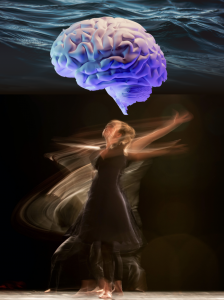
C-DaRE invites… Emily Cross
6 March 2024 11:00 – 12:30 GMT
Emily Cross leads the Social Brain Sciences unit at ETH Zurich. Her research bridges technology, arts, and the biological and social sciences. Emily will present her research followed by a Q&A led by Simon Ellis.
Register here: https://forms.gle/2Dq7eCkd8sXxJ6bY7 to get the Zoom link to join.
Thinking bodies and dancing brains
Why do we dance, and why are we moved by dance? Competing accounts suggest that our motivation to dance springs from reasons that are either deeply personal (such as for purposes of exercise, entertainment, or artistic expression), or inherently social, which play a key role in facilitating relationships with others in a social world. A more recent account, however, suggests that the mechanisms of dance are more complex, and as dance scholar and philosopher Kimerer LaMothe suggests, humans “are creatures who evolved to dance as the enabling condition of [our] own bodily becoming.” In this talk, I consider what psychological, neuroscientific, and even AI studies can tell us about how we perceive dance, and why we might enjoy watching others dance. My aim is not to dissect the phenomenological experience of watching dance into something so granular as to erase the deeply human pleasure of dancing or watching others dance, but to instead highlight what different scientific disciplines can reveal about this ubiquitous and fundamental means of expression.
Emily is a dancer and cognitive neuroscientist by training, and leads the Professorship for Social Brain Sciences at ETHZ in Zurich, Switzerland. Prior to this, she was based jointly in Sydney, Australia (at the MARCS Institute at Western Sydney University and the Department of Cognitive Science at Macquarie University) and Glasgow, Scotland (at the School for Psychology and Neuroscience and the University of Glasgow). Emily leads a vibrant and diverse research team that uses brain imaging techniques, robots, and complex learning paradigms often involving dance to explore how experience-dependent plasticity and expertise is manifest across brain and behaviour, and the affective value of performing arts.
Image: Collage by Emily Cross images by Ahmad Odeh (dancer), Fakurian Design (brain) and Marko Blazevic (waves).